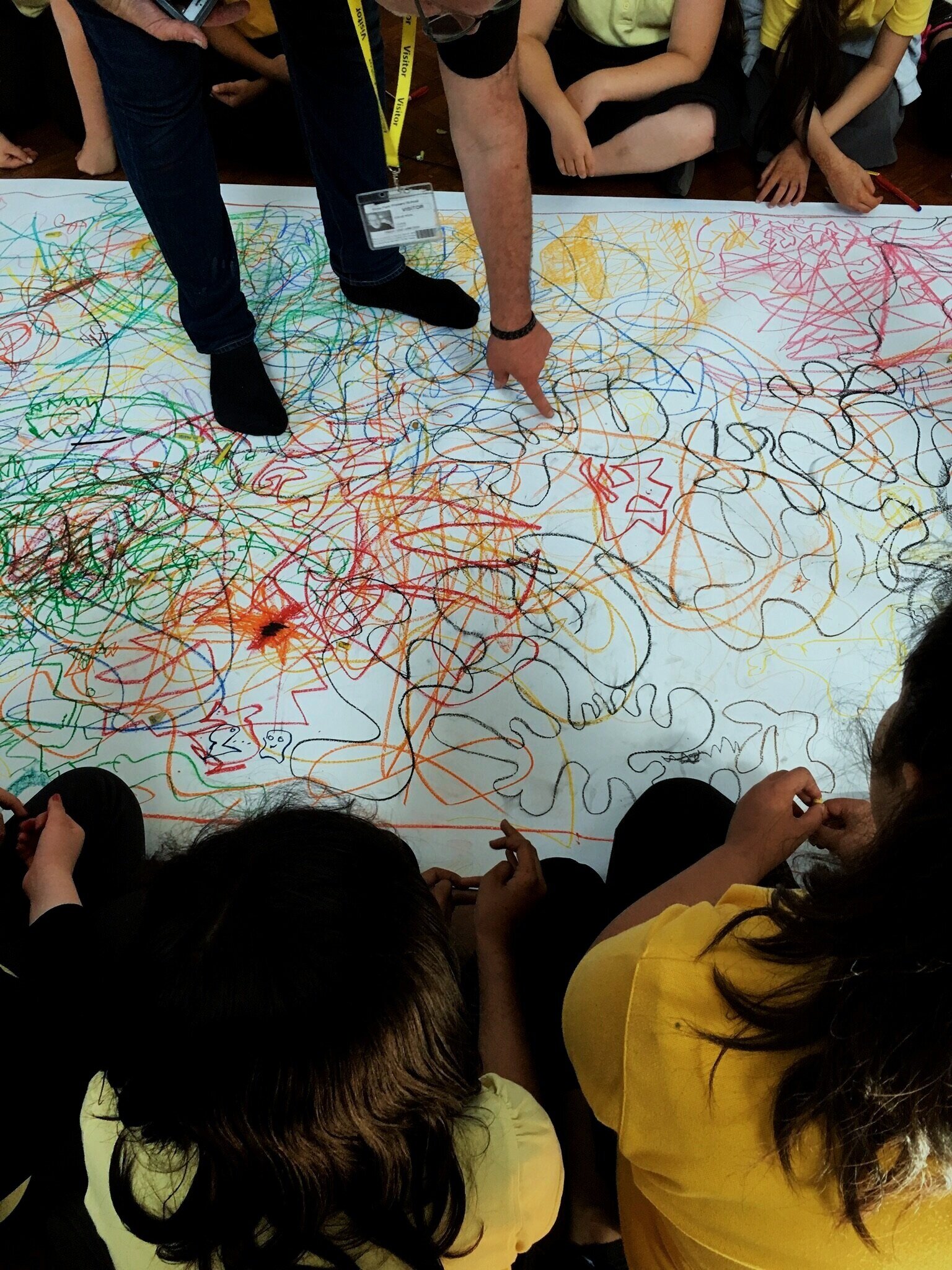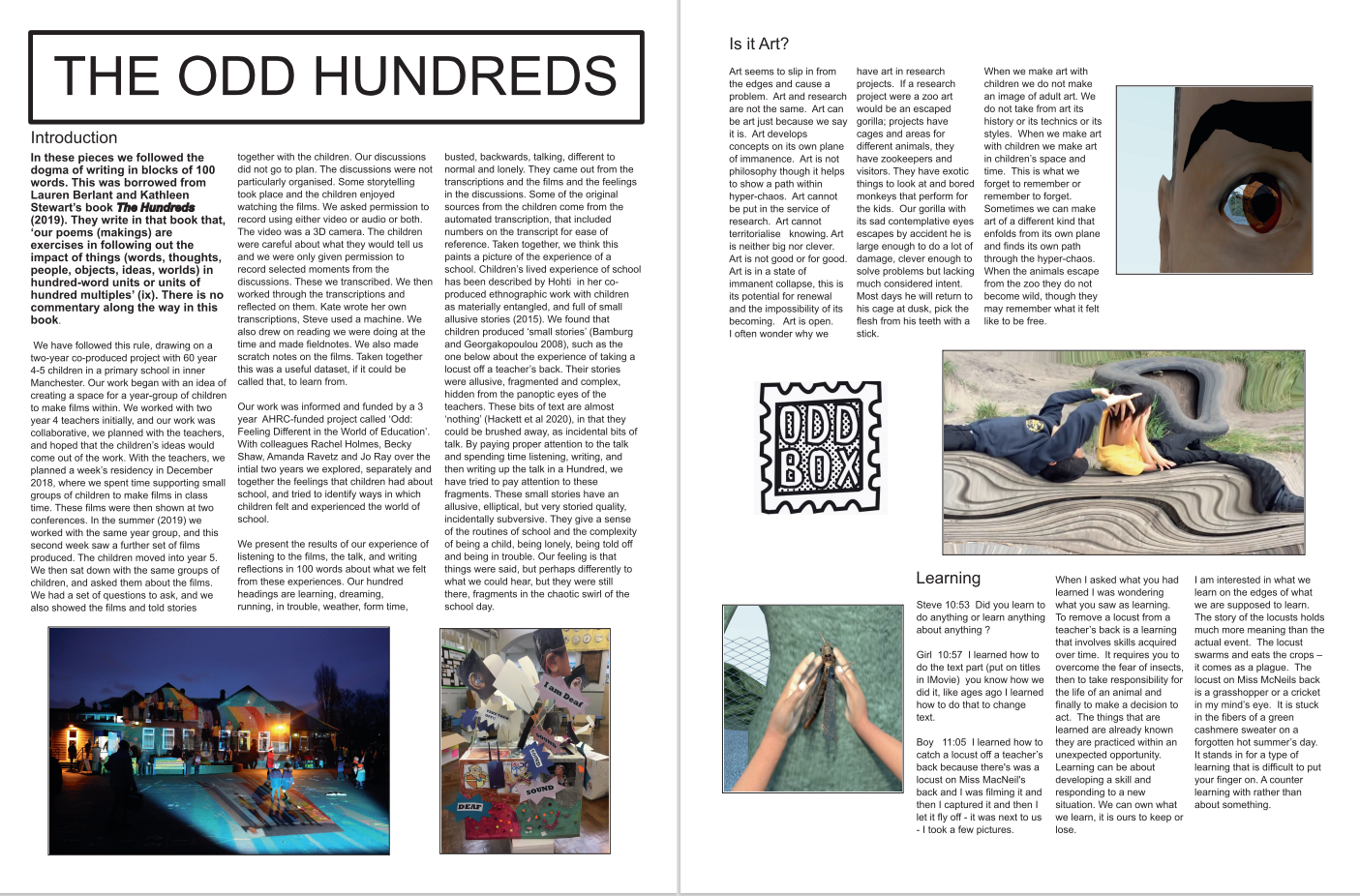
Together
Together
Our research in Odd has sought to create the conditions to be with others and be with the resonance of life in, and of, school.
From how the sensed textures of the school were folded into children’s collaborative practices, to creating the conditions for researchers (and undergraduate students) to be in the process together, to finding ways to more ethically be with children in research.
Central to the whole of the Odd project was developing a critical framework of ethics that went beyond a ‘tickbox’ exercise.
In this thread we look at ways that being together or being 'with' has offered insight.
Research with children, introducing how Kate Pahl and Steve Pool’s co-production with children opened up ideas of consent and agency in school.
Companions, in which Amanda Ravetz's time in ‘Position of Child’ revealed ways in which we can be with human and non-human presences, and the connection that can afford.
Impersonal Intimacies in which we consider the ways that undergoing a process together can bring insight.
We invite you to test some ways or thoughts about being together, coming to know together.
Research with children
For Kate Pahl and Steve Pool, research together with children meant involving the children in deciding what the research activity would be. The researcher and artist did this over three years, as they worked with the same group of young people at Alma Park as they moved through Years 4, 5 and 6.
Their aim was to centre young people in the research process. This meant avoiding extracting what they said or did as ‘data’ to be labelled and given meaning externally, not imposing themselves on the process (either as adults or as researcher and artist) but being there alongside and in dialogue with the children’s experiences.
Allowing this complexity often called for the hasty adult-world demands to be slowed down, challenging everyone involved to consider and to feel how we may sometimes need to resist 'business as usual' to really hear and be with children in their worlds.
Image description: a hand writing on flipchart with notes listing plans for a week’s events in school. Kate and Steve's planning process with teachers at alma park deliberately balanced enough structure to hold a space for new possibilities, with enough freedom to allow the unexpected to unfold.
“Ethics is the project, not an add on or process to go through and finish. Slowing down the ethics made the research process strange, as it deconstructs. It gives power to young people.”
Centring the voices and knowledges of children was important to Kate and Steve’s work. Kate ran a poetry workshop where children were invited to share their ideas of 'Oddness', what they feel about difference, their experiences of life.
These were made during Kate and Steve's first year of work in school, and were consciously gifted to the project. The children knew they could say 'no' to giving their words and ideas to the research.
“Informed consent means really making clear what research is, what a conference is. Bringing the worlds together.
Ethics became more important as a useful tool in the course of Odd. And, even though there’s limited choices within education, it’s good to try to open it up.”
Image descriptions: scanned images showing hand written poems on bright post-it notes, made by children about the idea of 'Oddness',
One of the results of Kate and Steve’s processes with the school community was The Odd Hundreds, a newspaper formatted collection of writing bringing together the experiences and reflections of the young people. Click here or on the image to read the collection (PDF format).
What kinds of experiences would you capture if you were thinking about feeling ‘odd’?
What does it mean to take children’s words seriously?
How would we need to adapt in order to do this?
Steve Pool’s work with young people at Alma Park Primary School connected with his interest in what we learn on the edges of what we’re supposed to be learning, learning with rather than about. Click below to watch Locusts, a short film by Alice Pool and Steve Pool.
Companions
Amanda Ravetz joined Alma Park as a new pupil, spending a full week immersed as a class member in nursery, then a day a week over a school year in reception class. Her experiences in ‘position of child’ were affecting and physical. She has spoken and written about experiences of companionship in school, with children, through things other than words.
Feedback from Amanda’s session sharing her research with undergraduate students training to work with children.
‘Amanda’s experience of her time in school...encouraged us to start looking at things from the child’s perspective. An awareness of our own bodies can help us connect with children’s experiences (Horner, 2017). Hence, the session on affective methods helped us become more aware of our bodies - reflecting upon the times we were children at school, and how we would feel when asked to do different things. Reflecting upon my own experiences helped me become more attuned to the children's experiences. ‘
‘I never expected to feel so internally connected to a session’.
See references here.
Image description: a drawing of a bag with food and a teddy bear in it. This was a learning exercise done by Amanda called ‘My Picnic Food’ showing items of food coloured in with pencil crayon, cut out and stuck onto a picnic basket.
Impersonal Intimacies
An ‘after school club’ is a place and time that is part of school but beyond the curriculum, allowing children to be in the school building with a different purpose, affording ways of being together based on process rather than focussing on an outcome.
Becky Shaw and Jo Ray established the ‘Curious Club’ as a way to extend the sensing work that Becky had begun, revisiting unusual tools and technologies, and by allowing interaction between people of different ages to develop through collaborative, meandering practices.
A potential for empathy, communality, and attunement to space and atmospheres arose through processes that included sensing and making sounds, making dens and wearable forms that we could hide in; hiding from and seeking with one another.
Activities introduced were consciously used as 'props' to set in motion the practices of the children, they were re-purposed and evolved in unanticipated ways.
Image description: a child wears material based on close up photographs of the school, as part of the after-school ‘Curios Club’.
Image description: an historical illustration of two women communicating through cups and string.


